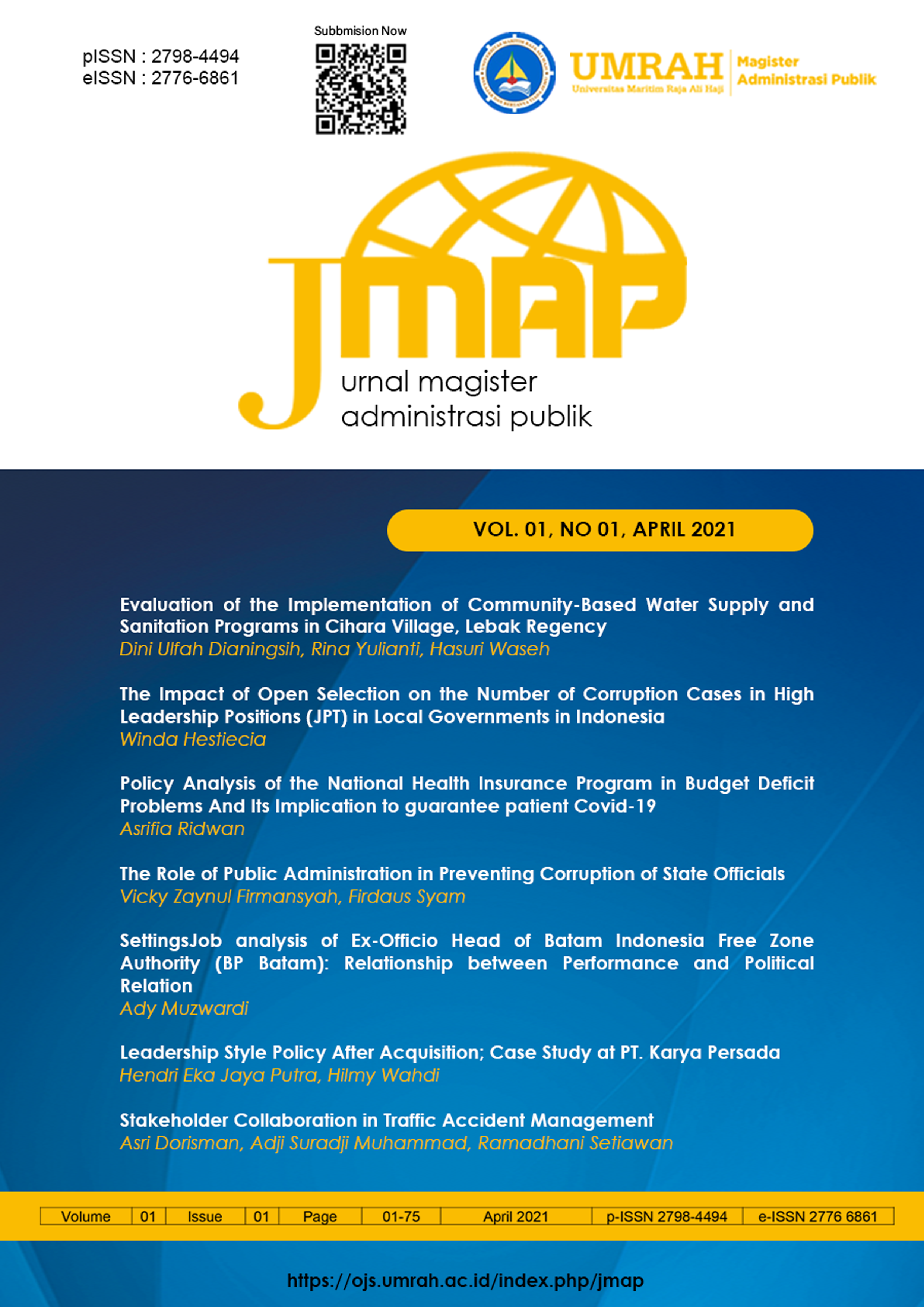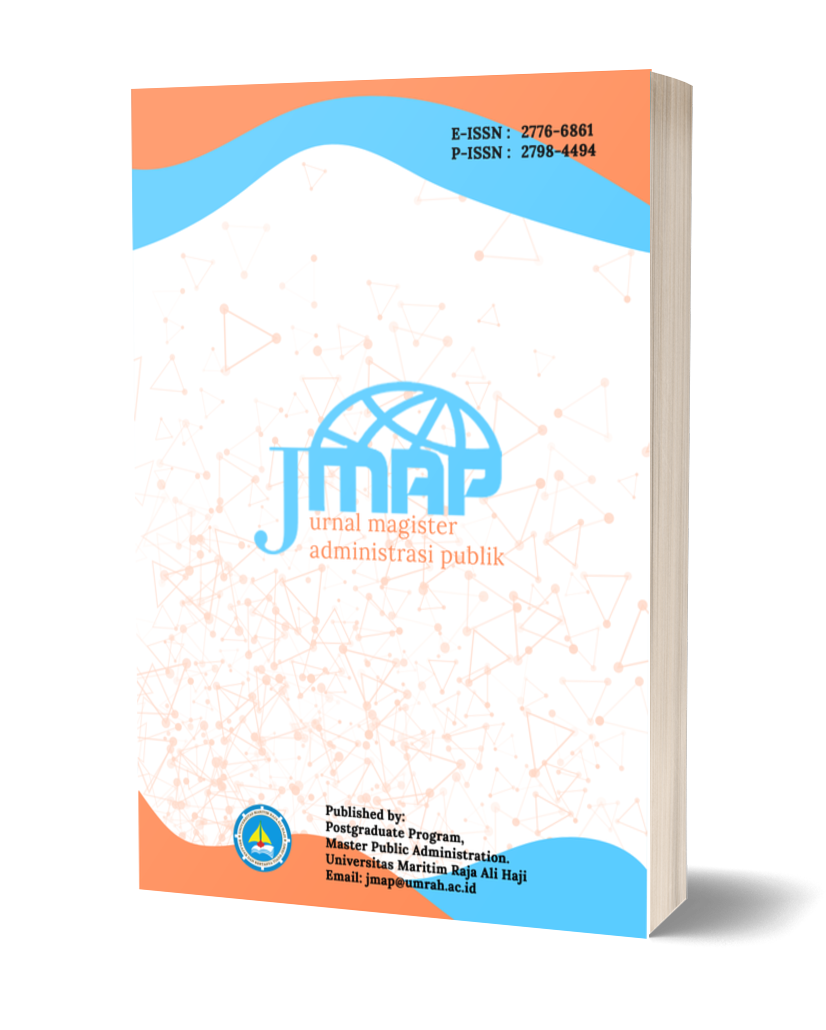The Impact of Open Selection on the Number of Corruption Cases in High Leadership Positions (JPT) in Local Governments in Indonesia
DOI:
https://doi.org/10.31629/jmap.v1i1.3351Keywords:
Open Selection, Corruption, High Leadership PositionAbstract
This study aims to explain the impact of implementing open selection on the amount of corruption in local government JPT in Indonesia. Using the difference-in-differences-in-differences (DDD) approach, this study analyzes panel data on JPT corruption in Indonesia that have been inkracht handled by the Corruption Eradication Commission (KPK) in the period 2009-2019. The results of theoretical studies and previous research have given rise to the hypothesis that the implementation of open selection has a positive impact on reducing JPT corruption cases in local governments in Indonesia. This study found that the implementation of open selection can reduce the number of corruption cases by -0.892% and significantly at the 10% alpha level in regions with high total capital expenditures. This finding demonstrates the positive impact of open selection on JPT corruption cases and thus supports previous studies on the positive impact of implementing a merit system, in particular open selection on the number of JPT corruption cases in regions with high total spending. In addition, to strengthen the research results by adding case studies and in-depth interviews with KASN and ICW. It was found that it greatly influenced the implementation of open selection. It is the high political costs in the regions that are the main cause that causes corruption of governors, mayors, and regents followed by regional officials to continue to occur.
Downloads
References
Alesina, A., & Tabellini, G. (2007). Bureaucrats or politicians? Part I: a single policy task. American Economic Review, 97(1), 169-179. https://doi.org/10.1257/aer.97.1.169
Becker, G. S. (1999). Crime and Punishment: An Economic Approach', Journal of Political Economy. International Library of Critical Writings in Economics, 111, 141-189. https://doi.org/10.1086/259394
Chêne, M. (2019). Successful approaches to tackle petty corruption. Transparency International. https://www.jstor.org/stable/resrep20474
Creswell, J. W. (2013). Research Design: Pendekatan Kualitatif, Kuantitatif, dan Mixed (3rd ed.). Penerbit Pustaka Pelajar.
Dahlström, C., Lapuente, V., & Teorell, J. (2012). The merit of meritocratization: Politics, bureaucracy, and the institutional deterrents of corruption. Political Research Quarterly, 65(3), 656–668. https://doi.org/10.1177/1065912911408109
Dwiputrianti, S. (2018). Challenges With Implementation Of The Merit System In The Open Recruitment Of Government High Positions: The Case In Indonesia. 2018 Annual Conference of Asian Association for Public Administration:" Reinventing Public Administration in a Globalized World: A Non-Western Perspective"(AAPA 2018), 70–80. https://doi.org/10.2991/aapa-18.2018.8
Gultom, Y. M. L. (2019). Governance structures and efficiency in the US electricity sector after the market restructuring and deregulation. Energy Policy, 129, 1008–1019. https://doi.org/10.1016/j.enpol.2019.02.005
Gurgur, T., & Shah, A. (2005). Localization and corruption: panacea or pandora’s box? World Bank Policy Research Paper, 3486. http://down.aefweb.net/AefArticles/aef150103Gurgur.pdf
Halim, A. (2008). Dasar-Dasar Audit Laporan Keuangan. YKPN.
Hotho, J., Minbaeva, D., Muratbekova-Touron, M., & Rabbiosi, L. (2018). Coping with favoritism in recruitment and selection: a communal perspective. Journal of Business Ethics, 165, 1–21. https://doi.org/10.1007/s10551-018-4094-9
Hughes, R. (2010). Passage of Change: Chapter Corruption. Law, Society and Governance in the Pacific: ANU Press. https://www.jstor.org/stable/j.ctt24h3jd.11
Kasim, A. (2013). Bureaucratic Reform and Dynamic Goernance for Combating Corruption: The Challenge for Indonesia. BISNIS & BIROKRASI: Jurnal Ilmu Administrasi Dan Organisasi, 20(1). https://doi.org/10.20476/jbb.v20i1.1862
Katharina, R. (2018). Reformasi Manajemen Aparatur Sipil Negara: Evaluasi Peran Pejabat Pembina Kepegawaian dan Komisi Aparatur Sipil Negara. Spirit Publik: Jurnal Administrasi Publik, 13(2), 1–15. https://doi.org/10.20961/sp.v13i2.24864
Kellough, J. E. (1999). Reinventing public personnel management: Ethical implications for managers and public personnel systems. Public Personnel Management, 28(4), 655–671. https://doi.org/10.1177/009102609902800411
Khatri, N., & Tsang, E. W. K. (2003). Antecedents and consequences of cronyism in organizations. Journal of Business Ethics, 43(4), 289–303. https://doi.org/10.1023/A:1023081629529
Ko, K., & Weng, C. (2012). Structural changes in Chinese corruption. The China Quarterly, 718–740. https://doi.org/10.1017/S0305741012000793
Komisi Aparatur Sipil Negara. (2019). Penilaian Penerapan Sistem Merit dalam Manajemen ASN di Instansi Pemerintah Tahun 2019. Komisi Aparatur Sipil Negara.
McCourt, W. (2007). The merit system and integrity in the public service. Public Integrity and Anti-Corruption in the Public Service Conference, Bucharest, 29, 30.
McCrudden, C. (1998). Merit principles. Oxford Journal of Legal Studies, 18(4), 543–579.
Nasir, M. (2019). Reformasi Sistem Rekrutmen Pejabat Dalam Birokrasi Pemerintah (Studi Kasus Rekrutmen Pejabat Eselon II di Provinsi Nanggroe Aceh Darussalam. Jurnal Kebijakan Dan Manajemen PNS, 3(2). 1-8 https://jurnal.bkn.go.id/index.php/asn/article/view/165
Nunberg, B. (1994). Experience with civil service pay and employment reform: An overview. In D. Lindauer & B. Nunberg (Eds.), Rehabilitating government: Pay and employment reform in Africa (119-159). World Bank. http://go.worldbank.org/T7O81C87X0
Paul, J. G. S. M. (2011). Impact Evaluation in Practice. The International Bank for Reconstruction and The Development/The World Bank.
Pearce, J. L. (2015). Cronyism and nepotism are bad for everyone: The research evidence. The Research Evidence. Industrial and Organizational Psychology, 8(1), 41–44. https://doi.org/10.1017/iop.2014.10
Pearce, J. L., Branyiczki, I., & Bigley, G. A. (2000). Insufficient bureaucracy: Trust and commitment in particularistic organizations. Organization Science, 11(2), 148–162. https://doi.org/10.1287/orsc.11.2.148.12508
Prendergast, C., & Topel, R. H. (1996). Favoritism in organizations. Journal of Political Economy, 104(5), 958–978. https://doi.org/10.1086/262048
Rauch, J. E., & Evans, P. B. (2000). Bureaucratic structure and bureaucratic performance in less developed countries. Journal of Public Economics, 75(1), 49–71. https://doi.org/10.1016/S0047-2727(99)00044-4
Rossen, B. (1975). The Merit System in the United States Civil Service. A monograph for the Committee on Post Office and Civil Service House of Washington. Government Printing Office.
Schroth, P. W. (2006). Corruption and Accountability of the Civil Service in the United States. The American Journal of Comparative Law, 54, 553–579. https://www.jstor.org/stable/20454553
Scully, G. W. (1991). Rent-seeking in US government budgets, 1900–88. Public Choice, 70(1), 99–106.
Setyowati, E. (2014). Analisis Merit System Dalam Proses Rekrutmen dan Seleksi CPNS di Kota Malang (Rekrutmen dan Seleksi CPNS Tahun 2000). Disertasi. Universitas Indonesia Depok.
Shah, A. (2007). Performance accountability and combating corruption. Public Sector Governance And Accountability Series. World Bank.
Suyito, S., Effendi, D., Yudiatmaja, W. E., Ghani, N. A., & Abd Wahab, M. A. (2018). Peranan dan kontribusi lembaga swadaya masyarakat dalam agenda pemberantasan korupsi di Indonesia: Studi di kota Tanjungpinang, Kepulauan Riau, Indonesia. Asian People Journal, 1(2), 146-161 https://journal.unisza.edu.my/apj/index.php/apj/article/view/73
Tim Penulis Buku Pendidikan Anti Korupsi. (2011). Pendidikan Anti-Korupsi Untuk Perguruan Tinggi. Kementerian Pendidikan dan Kebudayaan RI Direktorat Jenderal Pendidikan Tinggi.
Tjiptoherijanto. (2019). Reform of the Indonesian Civil Service: Looking for Quality. Journal of US-China Public Administration, 16(2), 56–66. https://doi.org/10.17265/2328-7144/2018.06.002
Tong, C. H., Straussman, J. D., & Broadnax, W. D. (1999). Civil service reform in the People’s Republic of China: case studies of early implementation. Public Administration and Development: The International Journal of Management Research and Practice, 19(2), 193–206.
World Bank. (2019). World Economic Forum (WEF), Government Effectiveness Index (GEI). https://tcdata360.worldbank.org/indicators/h8125e315
Yudiatmaja, W. E. (2016). Liberalisasi pendidikan tinggi di Indonesia. Dialektika Publik 1(2), 107-124
Downloads
Published
Issue
Section
License
You are free to:
- Share — copy and redistribute the material in any medium or format for any purpose, even commercially.
- Adapt — remix, transform, and build upon the material for any purpose, even commercially.
- The licensor cannot revoke these freedoms as long as you follow the license terms.
Under the following terms:
- Attribution — You must give appropriate credit, provide a link to the license, and indicate if changes were made . You may do so in any reasonable manner, but not in any way that suggests the licensor endorses you or your use.
- ShareAlike — If you remix, transform, or build upon the material, you must distribute your contributions under the same license as the original.
- No additional restrictions — You may not apply legal terms or technological measures that legally restrict others from doing anything the license permits.

































